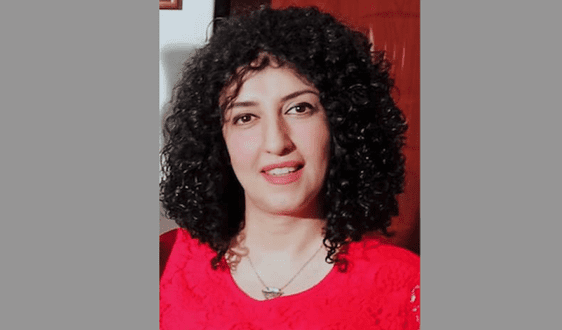VOA – Narges Mohammadi, the Nobel Peace Prize laureate, expressed her condolences on Instagram regarding the death of Armita Geravand.
“Armita Geravand, full of the enthusiasm of life, was sent to the brink of death because of her beautiful hair, which she had no intention of hiding with ‘mandatory hijab,’” she said in her post.
Geravand, 17, died following an alleged encounter with police over violating the country’s hijab law as she was entering a subway car at Meydan-E Shohada, or Martyrs’ Square, Metro station in southern Tehran on October 1, the official IRNA news agency reported on Saturday.
Mohammadi, in her Instagram post, criticized the secrecy surrounding Geravand’s death.
No independent reporter was allowed to enter the hospital, only those affiliated with state media, she wrote. Government news agencies announced the 17-year-old’s death, not her parents, Mohammadi wrote.
“When the ‘truth’ is buried and the defenseless victim, crying out for not ‘justice’ but not even for ‘pain,’ death is the least of human ‘pain’ and ‘suffering.’ Pain is, in reality, the lie, deceit, and deception of the Islamic republic government.
“I will never forget the innocent death of Armita Geravand, and I will not tolerate the ‘mandatory hijab’ anymore in her memory,” Mohammadi concluded.
The Nobel laureate has suffered multiple detentions and imprisonments in the past two decades due to her human rights activism in Iran and is currently incarcerated for her advocacy.
Abram Paley, the U.S. deputy special envoy for Iran, shared a post Saturday on “X” expressing his condolences over the teen’s death.
“The Iranian government’s state-sponsored violence against women and girls has had devastating consequences for numerous families, both within and outside of Iran,” Paley added.
The Norway-based Hengaw rights group, citing information provided by Geravand’s family members, said early Saturday that authorities have forbidden the family from transporting her remains for burial in her native Kermanshah, a city in Iran’s Kurdish-populated west.
Like many of Iran’s larger cities, Kermanshah saw a surge of anti-government protests over the past year in response to the September 2022 death of 22-year-old Mahsa Amini while in the custody of morality police.
Geravand’s death comes barely a year after Amini’s sparked months of anti-government protests over the state’s mandatory Islamic dress code and spiraled into the biggest show of opposition to Iranian authorities in years.
Reports of tight state control over Geravand’s funeral, which was reportedly set to take place on Sunday, indicate officials in Tehran may be concerned the event could spur a new wave of unrest.
 Shabtabnews In this dark night, I have lost my way – Arise from a corner, oh you the star of guidance.
Shabtabnews In this dark night, I have lost my way – Arise from a corner, oh you the star of guidance.



